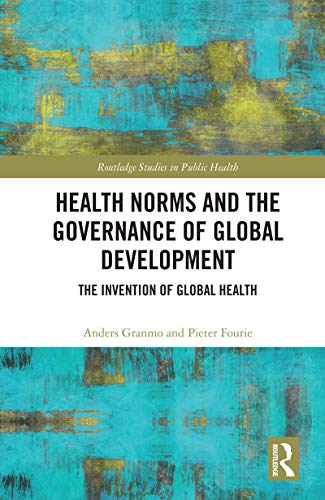This book maps the emergence of health in global development discourse and governance since 1990. It argues that health norms have emerged, diffused, and subsequently become internalised through the various direct and indirect negotiation processes that created the global development goals.
Covid-19, Ebola, and HIV/AIDS are prime illustrations of the fact that health is supremely political. Governments – whether they are local, national, international, or multilateral – make decisions about their policy responses, coordinate their response, and channel the necessary resources. Such decisions are informed by local and global conditions as well as sets of values, norms, and standards that determine policy and interventions. As states and regions become more interconnected, the politics of health are increasingly relevant to the sustainable future envisioned by global governance. This book explains how considerations of global health have come to inform and infuse the United Nations development agenda. It identifies processes, actors, institutions, and interactions in global health by analysing two related case studies: the Millennium Development Goals and the Sustainable Development Goals.
Providing an overview of, and insights about, the context of global development thinking and practice, the subtleties of global health, and global health governance, this book is an innovative contribution to the literature. It is suitable for students and scholars of global health, development studies, and international relations.
چکیده فارسی
این کتاب ظهور سلامت را در گفتمان توسعه جهانی و حکمرانی از سال 1990 ترسیم میکند. این کتاب استدلال میکند که هنجارهای بهداشتی از طریق فرآیندهای مختلف مذاکره مستقیم و غیرمستقیم که اهداف توسعه جهانی را ایجاد کردهاند، پدیدار شده، انتشار یافته و متعاقبا درونی شدهاند. p>
کووید-۱۹، ابولا، و اچآیوی/ایدز نمونههای اصلی این واقعیت هستند که سلامت کاملاً سیاسی است. دولتها - چه محلی، ملی، بینالمللی یا چندجانبه باشند - در مورد پاسخهای سیاستی خود تصمیم میگیرند، پاسخ خود را هماهنگ میکنند و منابع لازم را هدایت میکنند. چنین تصمیماتی با شرایط محلی و جهانی و همچنین مجموعه ای از ارزش ها، هنجارها و استانداردهایی که خط مشی ها و مداخلات را تعیین می کنند، آگاه می شوند. همانطور که ایالت ها و مناطق به هم پیوسته تر می شوند، سیاست سلامت به طور فزاینده ای با آینده پایدار پیش بینی شده توسط حکومت جهانی مرتبط است. این کتاب توضیح میدهد که چگونه ملاحظات بهداشت جهانی برای اطلاعرسانی و القای برنامه توسعه سازمان ملل متحد آمده است. با تجزیه و تحلیل دو مطالعه موردی مرتبط، فرآیندها، بازیگران، نهادها و تعاملات در سلامت جهانی را شناسایی میکند: اهداف توسعه هزاره و اهداف توسعه پایدار.
این کتاب با ارائه یک نمای کلی و بینشهایی در مورد زمینه تفکر و عملکرد توسعه جهانی، ظرافتهای بهداشت جهانی و حاکمیت بهداشت جهانی، کمکی نوآورانه به ادبیات است. این برای دانشجویان و دانش پژوهان بهداشت جهانی، مطالعات توسعه، و روابط بینالملل مناسب است.
ادامه ...
بستن ...










